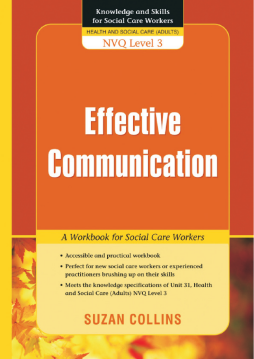
Additional Information
Book Details
Abstract
Social care workers in residential or domiciliary settings need to be able to communicate effectively in order to carry out their work.
Supporting people with a variety of difficulties including hearing loss, impaired speech, visual impairment, dementia and physical and learning disabilities requires a range of communication skills, such as listening, sign language, writing notes, and using body language, touch and stimulation. This workbook will provide workers with the ability to enable adults with limited or no verbal communication skills to make decisions, and to express their views in their preferred method of communication.
Effective Communication includes practical guidance on using communication tools, such as computers, staff photo rota boards and pictorial menu boards, and use of photographs as visual reminders. The workbook meets the requirements of care standards and also refers to the importance of recording and reporting, and dealing with sensitive and complex issues, such as breaking the news of a family bereavement, or communicating with a person who has been abused.
Designed to meet the requirements of Health and Social Care (Adults) NVQ Level 3, Unit 31, this workbook is also a valuable source of guidance for any social care worker wanting to improve communication with the people they support.
Suzan Collins is a trainer and consultant in management and social care. She delivers training throughout the UK to service users, support staff, managers and HR staff in the NHS, statutory, private and voluntary sectors. She also assesses and internally verifies NVQs in Health and Social Care and the Learning and Development awards, as well as being an active marker, verifier and consultant for the Learning Disability Induction Award programme. For more information go to www.suzancollins.com.
Table of Contents
| Section Title | Page | Action | Price |
|---|---|---|---|
| Introducing Sensemaker | |||
| Suitability Assessment | |||
| Phase 1: Preparation | |||
| Phase 2: Design | |||
| Phase 3: Collection | |||
| Phase 4: Sensemaking |
